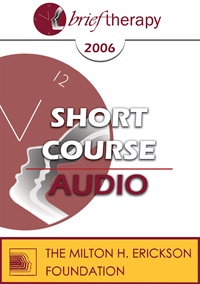
- Average Rating:
- Not yet rated
- Topic Areas:
- Short Courses | Brief Therapy | Psychotherapy | Cognitive Behavior Therapy (CBT) | Voice Therapy
- Categories:
- Brief Therapy Conference | Brief Therapy Conference 2006
- Faculty:
- Lisa Firestone, PhD | Joyce Catlett, MA
- Duration:
- 1:19:30
- Format:
- Audio Only
- Original Program Date:
- Dec 07, 2006
- Short Description:
- This workshop provides mental health professionals with an introduction of Voice Therapy, an innovative cognitive/affective/behavioral technique that facilitates change in psychotherapy. Through lecture, discussion and video tapes, participants will learn how to use voice therapy techniques and exercises to help patients overcome destructive thoughts and behavior in order to make meaningful changes in their lives.
- Price:
- $15.00 - Base Price
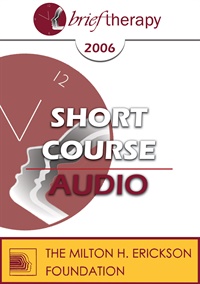
- Average Rating:
- Not yet rated
- Topic Areas:
- Short Courses | Children and Adolescent Therapy | Experiential Therapy | Brief Therapy | Psychotherapy
- Categories:
- Brief Therapy Conference | Brief Therapy Conference 2006
- Faculty:
- Jaelline Jaffe, PhD
- Duration:
- 1:18:44
- Format:
- Audio Only
- Original Program Date:
- Dec 07, 2006
- Short Description:
- Most therapy is verbal and logical; most troubled teens are neither! Brain scans now explain why, and we need to connect with kids where they are. Adolescents respond to experiential and behavioral approaches. Successful intervention with teens includes activities engaging the body, mind, emotion and creativity to accomplish far more than talk therapy alone. Come experience several fun, interactive strategies immediately useful with teenage clients, no matter how withdrawn, hostile, or defensive they appear to be.
- Price:
- $15.00 - Base Price
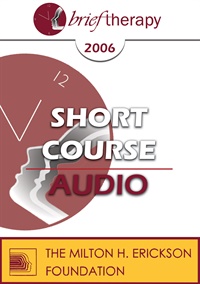
- Average Rating:
- Not yet rated
- Topic Areas:
- Short Courses | Psychotherapy | Brief Therapy | Therapist Development
- Categories:
- Brief Therapy Conference | Brief Therapy Conference 2006
- Faculty:
- Ana Almeida Melikian, MA
- Duration:
- 1:18:24
- Format:
- Audio Only
- Original Program Date:
- Dec 07, 2006
- Short Description:
- This course aims to provide a compass that helps to navigate within the different models of psychotherapy. This instrument comes in the form of a useful scheme with several levels: metaphysical, theoretical, technical and practical. Some classical models are going to be presented. Examples will be given of how to apply it to a model that the therapist recently became acquainted with, and time will be dedicated to reflect on our own clinical models.
- Price:
- $15.00 - Base Price
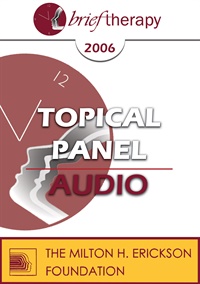
- Average Rating:
- Not yet rated
- Topic Areas:
- Topical Panels | Art and Creativity | Psychotherapy | Brief Therapy
- Categories:
- Brief Therapy Conference | Brief Therapy Conference 2006
- Faculty:
- Stephen Lankton, MSW | Scott Miller, PhD | Erving Polster, PhD | Frances Vaughan, PhD
- Duration:
- 59:19
- Format:
- Audio Only
- Original Program Date:
- Dec 08, 2006
- Short Description:
- BT06 Topical Panel 02 - Psychotherapy: Art or Science? - Stephen Lankton, MSW, DAHB, Scott Miller, PhD, Erving Polster, PhD, Frances Vaughan, PhD
- Price:
- $15.00 - Base Price

- Average Rating:
- Not yet rated
- Topic Areas:
- Workshops | Research | Brief Therapy | History of Psychotherapy | Psychotherapy
- Categories:
- Brief Therapy Conference | Brief Therapy Conference 2006
- Faculty:
- Scott Miller, PhD
- Duration:
- 2:03:53
- Format:
- Audio Only
- Original Program Date:
- Dec 07, 2006
- Short Description:
- At last count, over 400 separate models of psychotherapy have been found to exist (Garfield & Bergin, 1994). Despite the claims and promises made by the proponents of the various treatment models, 40 years of increasingly sophisticated outcome research has not found any one model or technique superior for the resolution of the problems that clients bring into treatment, Indeed, most of the research has only confirmed "common sense" (Frank 1993). In this workshop, forty years of outcome research will be translated into practical, common sense and empirically supported therapeutic skills that you can use for the efficient and effective resolution of the problems that clients bring to treatment.
- Price:
- $15.00 - Base Price
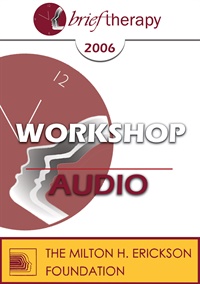
- Average Rating:
- Not yet rated
- Topic Areas:
- Workshops | Psychotherapy | Brief Therapy | Adlerian Therapy
- Categories:
- Brief Therapy Conference | Brief Therapy Conference 2006
- Faculty:
- Jon Carlson
- Duration:
- 2:38:23
- Format:
- Audio Only
- Original Program Date:
- Dec 07, 2006
- Short Description:
- BT06 Workshop 06 - Brief Adlerian Psychotherapy - Jon Carlson, EdD, PsyDAdlerian psychotherapy is an effective brief therapy model that integrates strategies from many approaches. Adler's ideas highlight the importance of not only understanding the individual but the social context. This approach emphasizes working from a multi-cultural orientation and highlights personal responsibility. The approach uses a four-step process: Engagement, Assessment, Insight and Reorientation. The focus of treatment is positive as the therapist uses encouragement strategies to help the client identify their assets and strengths. Video-tape examples of actual sessions will be used to highlight the process and demonstrate how effective short-term change is possible with this approach.
- Price:
- $15.00 - Base Price
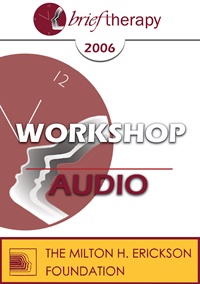
- Average Rating:
- Not yet rated
- Topic Areas:
- Workshops | Neuroscience | Psychotherapy | Brief Therapy | Mind-Body | Four-Stage Creative Process | Art and Creativity
- Categories:
- Brief Therapy Conference | Brief Therapy Conference 2006
- Faculty:
- Ernest Rossi, PhD
- Duration:
- 2:08:18
- Format:
- Audio Only
- Original Program Date:
- Dec 07, 2006
- Short Description:
- An introductory presentation reviewing how our daily mental activity may turn on the activity-dependent gene expression and protein synthesis cycle to construct and reconstruct the neural networks of our mind-brain and facilitate healing of the body. We will explore innovative approaches to facilitating the four-stage creative process in therapeutic hypnosis and psychotherapy in a group process and individual demonstrations.
- Price:
- $15.00 - Base Price
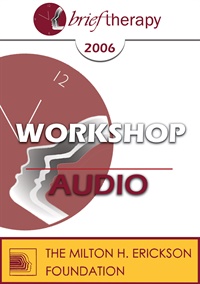
- Average Rating:
- Not yet rated
- Topic Areas:
- Workshops | Psychotherapy | Tailoring | Relationships | Brief Therapy | Therapeutic Relationship
- Categories:
- Brief Therapy Conference | Brief Therapy Conference 2006
- Faculty:
- John C. Norcross, PhD
- Duration:
- 2:38:59
- Format:
- Audio Only
- Original Program Date:
- Dec 09, 2006
- Short Description:
- BT06 Workshop 14 - Psychotherapy Relationships That Work: Tailoring the Relationship to the Individual Patient - John Norcross, PhDPsychotherapy will maximize its effectiveness by targeting the most powerful sources of change, the therapeutic relationship and the patient him/herself. This practical workshop will provide an integrative structure for customizing therapy relationships to individual clients. Participants will learn to reliably assess and rapidly apply four evidence-based guidelines (patient preferences, stages of change, resistance level, real-time feedback) for constructing the "relationship of choice."
- Price:
- $15.00 - Base Price
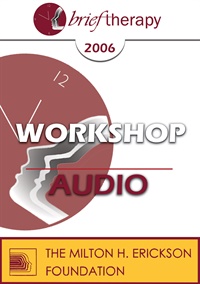
- Average Rating:
- Not yet rated
- Topic Areas:
- Workshops | Meditation, Spirituality and Yoga | Psychotherapy | Brief Therapy | Experiential Therapy
- Categories:
- Brief Therapy Conference | Brief Therapy Conference 2006
- Faculty:
- Frances Vaughan, PhD
- Duration:
- 2:16:24
- Format:
- Audio Only
- Original Program Date:
- Dec 09, 2006
- Short Description:
- Given the increasing popularity of spirituality in the culture, this workshop will address the relationship of spirituality to mental health. We will combine discussion with experiential exercises demonstrating practical methods of spiritual inquiry. Participants will learn to identify common problems associated with spirituality and strategies for encouraging healthy spiritual growth.
- Price:
- $15.00 - Base Price
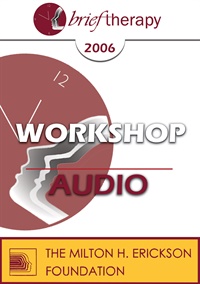
- Average Rating:
- Not yet rated
- Topic Areas:
- Workshops | Adlerian Therapy | Brief Therapy | Couples Therapy | Psychotherapy | Relationships
- Categories:
- Brief Therapy Conference | Brief Therapy Conference 2006
- Faculty:
- Jon Carlson
- Duration:
- 2:38:42
- Format:
- Audio Only
- Original Program Date:
- Dec 09, 2006
- Short Description:
- Brief Adlerian Couples Therapy will be described in detail. The key components of Adler's approach as they apply to couples therapy will be highlighted, including the numerous strategies and techniques that are unique to this approach. The program also will show how to integrate the strategies of other theories into this model. The core skills of effective relationships will be discussed and integrated into actual treatment protocols. Several examples from actual couples therapy sessions will be used to show the process as well as to demonstrate the strategies. The program will conclude with ideas that can be used to help couples prevent relapse after an effective intervention has been made.
- Price:
- $15.00 - Base Price
Please wait ...

